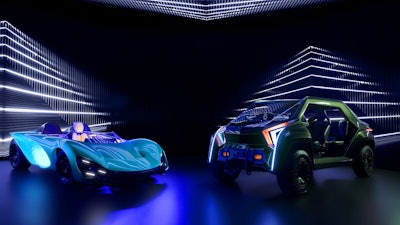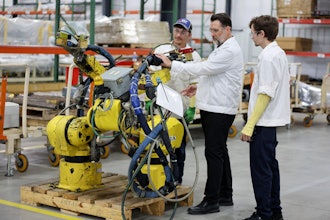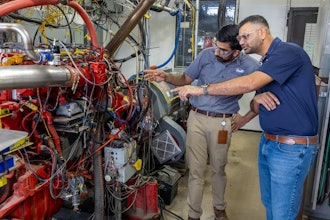
The Savannah College of Art and Design (SCAD) is proud to announce that students within its award- winning industrial design program have created two fully functioning electric vehicle concept cars. Each car puts the guest in the driver's seat of their own experience, with functional designs capable of cruising down coastal highways and navigating challenging off-road terrain — meant to engage and encourage the next generation of driving public.
SCAD has previously developed several concepts and prototypes for vehicles and boats. This year, however, the focus was on curating an experience for Gen Z — a demographic who views driving differently than previous generations. Initial research found 75% of this age group does not look forward to getting their driver's license. SCAD students set out on a mission to change this perception.
The project emphasized pooling innovative student talent from across the university's top-ranked degree programs, including interior design, fibers, motion media design, graphic design, user experience (UX) design, and interactive design and game development. The various builds and elements of each vehicle reflect the disciplines involved, as well as the creative ingenuity of the SCAD students who brought these vehicles from concept to completion.
The Aether electric vehicle, developed in Savannah, proposes a new design language that appeals to the Gen Z demographic while paying homage to influential cars of the past, including the Ferrari 312 F1 and the Porsche 917. The vehicle's racing aesthetic includes an open top and an AI companion that curates music based on driving style. Aether was entirely printed with innovative 3D technology that incorporates acrylic gel photocured with UV lights. This technology was a key element to the success of developing the car in record time, making Aether the first car ever built using this technology.
Tyr, the electric vehicle created in Atlanta, evokes the narratives and causes crucial to Gen Z. Environmentally-minded SCAD students created a car centered on sustainability and used intentional colors, designs, and relevant features to empower the driver's personal journey. In a recent SCADask survey of Gen Z respondents, the university's leading research unit, fuel efficiency, environmental impact, and technology features were all listed as top transportation priorities.
Throughout the development process, students worked alongside esteemed faculty and industry mentors to learn specialized skills that were essential to building successful and fully functioning electric vehicles. The emphasis SCAD places on application over theory is unlike any other industrial design program, placing students in pole position on the course to a successful career.






















